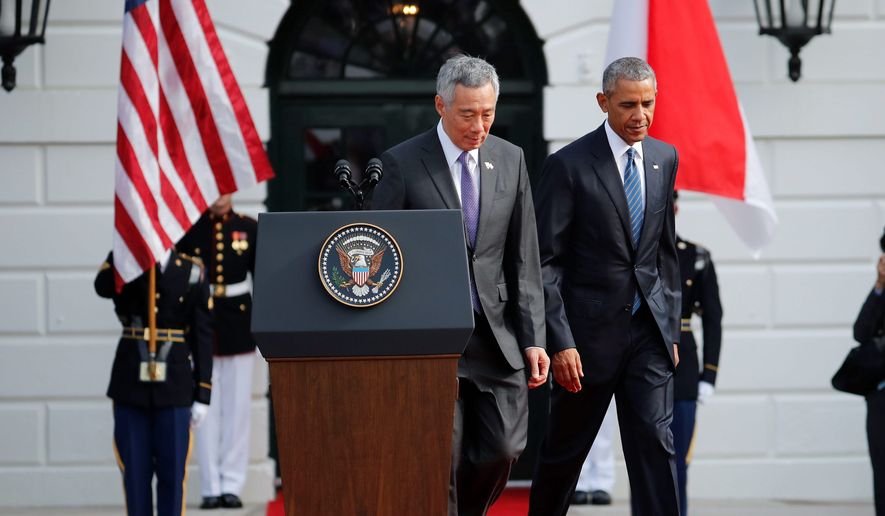As the prospects for President Obama’s signature Asian trade deal look increasingly bleak, the question has become: If not the TPP, then what? For the U.S., there may be no plan B.
Presidential candidates Hillary Clinton and Donald Trump have gone on record against the proposed Trans-Pacific Partnership, and analysts warn that walking away from the agreement would allow China and Japan to set their own rules for trade and investment in the globe’s most dynamic economic region.
The massive free trade deal, involving the U.S. and 11 other Pacific Rim nations covering 40 percent of the global economy, is the centerpiece of Mr. Obama’s proposed “pivot” to Asia, in addition to diplomatic, security and political payoffs.
Mr. Obama and visiting Singaporean Prime Minister Lee Hsien Loong warned Tuesday about the implications of a failed TPP. China would step in, Mr. Obama said, and Beijing is “not worried about labor standards or environmental standards or human trafficking or anti-corruption measures” incorporated into the agreement.
“You’ll get a low-standard, lowest-common-denominator trade deal,” the president said.
Gary Hufbauer, a trade analyst at the Peterson Institute for International Economics, said China — which is not a party to the TPP — has options to exploit a potential failure of the TPP.
If the deal collapses, Mr. Hufbauer said, leaders in Beijing “might see it as a big vacuum that China could attempt to fill to become the leader of the world trading system. But they might also take a very different tack on their approach than in the past. Regardless, if the U.S. stumbles, the plate for leadership is there for China to take.”
China is pursuing a regional economic accord of its own, the Regional Comprehensive Economic Partnership, a 16-nation bloc involving many of the same nations as the TPP.
Mr. Hufbauer said China is notorious for trade agreements that offer fewer provisions on the environment, labor and intellectual property and are less strict on removing trade barriers. He said the Regional Comprehensive Economic Partnership is less rigorous than the TPP but that China might raise its sights if the agreement fails.
“If China really saw this as a strategic opportunity to have leadership on the world stage, it would try to invigorate the World Trade Organization and use that organization to open its own market,” he said. “It also might rehash the RCEP from a light agreement to a deep agreement.”
Daniel J. Ikenson, director of the Herbert A. Stiefel Center for Trade Policy Studies at the Cato Institute, faulted Mr. Obama’s marketing strategy. Large swaths of the Republican Party, which historically has backed large trade agreements, won’t sign on to the TPP.
“[Mr. Obama] has been a poor salesman,” Mr. Ikenson said. “He’s saying, ’We have to do trade agreements or we’ll get gobbled up by China.’ There’s a more nuanced way of saying it.”
Mr. Ikenson predicted that “U.S. businesses will be on the outside looking in” if the TPP fails and that the effects wouldn’t be solely economic.
“U.S. credibility will take huge hit,” he said. “These other governments have all been banking on it, and if we can’t ratify it here, it will be a long time until they trust the U.S. again.”
Left at the altar
Commerce Secretary Penny Pritzker made an explicit national security argument in a pitch Wednesday to employees of the high-tech Qualcomm Inc. in San Diego. She noted that 100 trade deals have been struck across the Asian-Pacific market since 2000, many of which do not include U.S. interests.
“Ladies and gentlemen, let’s be frank,” Mr. Pritzker said, according to the Times of San Diego. “The world is watching. American leadership and prosperity are at stake with this agreement.”
Singapore’s Mr. Lee on Tuesday said many rising Pacific Rim economies have taken political risks of their own and that Congress’ rejection of the TPP could sour Washington’s relations in the region.
“Your partners, your friends who have come to the table, who have negotiated, each one of them has overcome some domestic political objection, some sensitivity, some political cost to come to the table and make this deal,” Mr. Lee said. “And if, at the end, waiting at the altar, the bride doesn’t arrive, I think there are people who are going to be very hurt.”
Claude Barfield, a trade analyst at the American Enterprise Institute, said the other parties to the agreement “will go ahead and pass it without us.”
“They could negotiate among themselves. There’s nothing to stop the other 11 from going beyond TPP rules,” he said.
If Japan musters legislative support for the TPP, Mr. Hufbauer said, the agreement would have enough weight to proceed without U.S. participation.
“Japan would say, ’We don’t want all the leadership to go to China. We’re the remaining big country. Let’s go ahead with TPP led by us. Forget about the U.S. We’ll take the leadership,’” Mr. Hufbauer said. “And for many TPP countries, access to Japan is a big plus.”
Mr. Hufbauer said a President Hillary Clinton would rebrand the agreement to sell it to Congress, as her husband, President Bill Clinton, did in 1993 with the North American Free Trade Agreement.
Mr. Barfield said Mrs. Clinton would add more labor and environmental protections.
“I think Hillary Clinton will find a way,” Mr. Ikenson said. “It needs to be good for U.S. workers, raise wages and increase security. I think she can make the case for it.”
Mr. Ikenson said the same goes for Mr. Trump, who has pledged to “rip up” the deal if elected.
“Trump would realize that this would increase his power as the commander in chief,” Mr. Ikenson said. “What better way to make America great again than by putting it at the forefront of international trade?”
• Jessie Fox can be reached at jfox@washingtontimes.com.




Please read our comment policy before commenting.